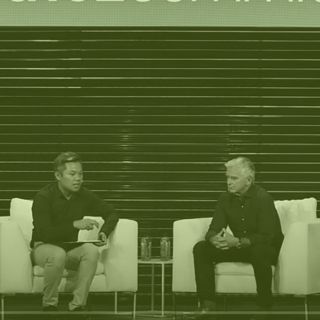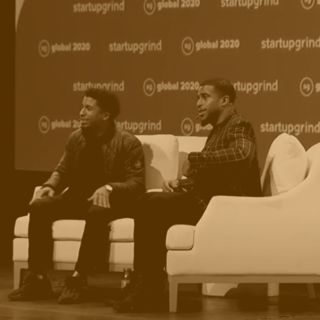
Pandemics: Early Detection, Networks, Spreaders
Pandemics are predictable; what's not predictable is the intensity, or the precise timing of arrival. That's where early detection -- not just rapid warning (as with something like Google Flu Trends back in the day), or even delayed warnings (as with CDC flu trackers and such) -- comes in. Because unfortunately, many disease tracking efforts old and new are "like watching the weather forecast a week after you've experienced that weather", observes a16z general partner Jorge Conde.And this matters for saving lives; for load balancing and allocating resources (ventilators, PPE, supplies); getting back to work; and much more. Even a two-week advantage could have made a huge difference! Which is what sociologist and physician Nicholas Christakis (who directs the Human Nature Lab, part of the Yale Institute for Network Science, and also author of the book Blueprint) learned from the H1N1 pandemic. Specifically, the role of social network "sensors" -- where friends in one's network graph can be like canaries in the proverbial coal mine to help detect pandemics earlier.In fact, the lab recently released an app called Hunala (which uses information crowdsourced among networks) to determine one's likelihood of contracting flu/ influenza-like or other respiratory illnesses through a personalized daily assessment of risk. Kind of like Waze, but for illnesses not car accidents. So in this episode of the a16z Podcast, the two take that analogy far. They also discuss the role of other mobility data and population flows in China for where and when the pandemic spread; the nuances behind "superspreaders"; how bad is the coronavirus, really; and the near future of "bio-surveillance" -- not just from a personal risk perspective, but from a global public-health perspective... Can we get the holy grail here without sacrificing privacy and agency?
23 Maj 202034min

Podcasting and the Future of Audio
This podcast (first recorded in 2019, now being rerun) -- is a podcast about podcasting: But it's really all about audio. A lot's changed... and a lot hasn't. How do we define "podcasts"; how does the feeds ecosystem currently work; what content and entertainment experiments might change how people not just consume, but create, in the medium? Not to mention monetize, discover, etc... Nick Quah, writer and publisher of Hot Pod (also at Vulture) joins a16z general partner Connie Chan -- and editor in chief (and showrunner of the a16z Podcast) Sonal Chokshi -- to talk about all this and more in this hallway-style jam. The views expressed here are those of the individual AH Capital Management, L.L.C. (“a16z”) personnel quoted and are not the views of a16z or its affiliates.This content is provided for informational purposes only, and should not be relied upon as legal, business, investment, or tax advice. You should consult your own advisers as to those matters. References to any securities or digital assets are for illustrative purposes only and do not constitute an investment recommendation or offer to provide investment advisory services. Furthermore, this content is not directed at nor intended for use by any investor or prospective investor, and may not under any circumstances be relied upon when making a decision to invest in any fund managed by a16z. (An offering to invest in an a16z fund will be made only by the private placement memorandum, subscription agreement, and other relevant documentation of any such fund which should be read in their entirety.)Past performance is not indicative of future results. Any charts and graphs provided within are for informational purposes solely and should not be relied upon when making any investment decision. Please see https://a16z.com/disclosures for additional important information.
20 Maj 20201h 6min

Growth in Turbulent Times
In normal times, every company operates against some hypothetical growth model—a data-driven framework that describes how your product grows and how you acquire new users. These, of course, are not normal times. In the fallout from the pandemic, most founders and CEOs are in the process of completely revamping their growth models from the bottom up amid new and unpredictable consumer behavior. This episode explores how to think about growth in turbulent times, according to two growth experts: a16z general partner Andrew Chen, who previously led the growth team at Uber, and Brian Balfour, formerly the VP of Growth at HubSpot, now the founder and CEO of Reforge, a masterclass in growth strategies (in conversation with host Lauren Murrow).The discussion spans four sections: first, how to reassess your existing growth model, particularly when, as Brian says, the data is "completely messed"; next, we drill down into strategy and tactics for surviving the current crisis and talk about how founders can pursue growth even in the midst of widespread uncertainty and cutbacks. Third, we look ahead to discuss scenario planning and how leaders can forge a path forward. Finally, we zoom out and assess the big picture: how various categories of company may be impacted long-term, how this crisis compares to 2008 (and what that means for early-stage founders), and the industries and business models that are now prime for growth.
15 Maj 202036min

Journal Club: Using CRISPR to Prevent Coronavirus and Influenza Infection
In this episode of a16z bio Journal Club, general partner Vijay Pande, bio deal team partner Andy Tran, and bio editor Lauren Richardson discuss a novel CRISPR-Cas-based anti-viral strategy.The discussion covers the differences between this newly developed prophylactic strategy, traditional vaccines, and anti-viral drugs; how this strategy can be engineered to target a huge range of coronavirus and influenza strains; and the next steps needed to go from paper to practice:“Development of CRISPR as an Antiviral Strategy to Combat SARS-CoV-2 and Influenza” in Cell (April 2020), by Timothy Abbott, Girija Dhamdhere, Yanxia Liu, Xueqiu Lin, Laine Goudy, Leiping Zeng, Augustine Chemparathy, Stephen Chmura, Nicholas Heaton, Robert Debs, Tara Pande, Drew Endy, Marie La Russa, David Lewis, and Lei Qia16z Journal Club (part of the a16z Podcast), curates and covers recent advances from the scientific literature -- what papers we’re reading, and why they matter from our perspective at the intersection of biology & technology (for bio journal club). You can find all these episodes at a16z.com/journalclub.
15 Maj 202017min

What's Next in Gaming
Video game technology has evolved into a global phenomenon that extends far beyond entertainment. In this episode, John Riccitiello, CEO of the game software development company Unity Technologies, is interviewed by a16z general partner Andrew Chen on the rise of esports and streaming, the potential of cloud gaming, and far-reaching applications for game technology. This conversation originally took place at our most recent innovation conference, the a16z Summit.
7 Maj 202020min

Undruggable Drugs
In this episode of the a16z Podcast, we take a deep dive into the world of drug development—specifically "undruggable drugs": a category of protein, protein family or even piece of RNA that’s so difficult to target that many researchers don’t even want to touch it. Jay Bradner, President of the Novartis Institute for BioMedical Research, shares with a16z General Partners Jorge Conde and Vijay Pande, and a16z's Hanne Tidnam, all the new tools, technologies and breakthroughs which are causing the science of therapeutics to explode in some of these areas where it's been incredibly difficult (even impossible) in the past. From molecular glues to cell and gene therapies, Bradner shares the behind-the-scenes science stories of what it really takes to make a new drug that shatters the category of an "undruggable" target.
6 Maj 202028min

The Next Generation of Cultural Influencers in Tech
This episode—which originally took place as a live event—is a conversation between Seattle Seahawks linebacker Bobby Wagner and a16z Cultural Leadership Fund partner Chris Lyons. Wagner is known for his power on the field and his business acumen off it. Last year, he negotiated his own three-year, $54 million contract extension to become the highest-paid middle linebacker in the NFL. In this candid conversation, Wagner and Lyons discuss how to identify standout companies and talent (for better or worse), the growing influence of cultural leaders in tech, and the potential of "shared genius."
2 Maj 202013min

The Chief Security Officer in (and out of) a Crisis
The Chief Security Officer (CSO/CISO) used to manage on-premise servers, now the information they have to secure has migrated to the cloud. As the responsibility of CSOs has expanded, the role has moved from technical IT to the boardroom. How do the best CSOs prepare for and respond to a crisis, from redteaming to comms? What responsibility should cloud & SaaS vendors, not to mention the government, have in security and data breaches? And how is the role going to evolve in the next five years? At our a16z Innovation Summit last year, we sat down with two security leaders whose career has evolved as the role has – Joe Sullivan, former CSO at Uber and Facebook, now at Cloudflare and Joel de la Garza, current security partner at a16z, formerly CISO at Box.
29 Apr 202020min






















